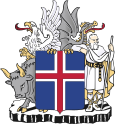 |
|---|
The government agencies in Iceland are state controlled organisations which act independently to carry out the policies of the Icelandic government.
Contents
- Parliament
- Agencies
- Committees
- Prime Minister's Office
- Agencies 2
- Ministry of Education, Science and Culture
- Agencies 3
- Education
- Science
- Culture
- Ministry for the Environment and Natural Resources
- Agencies 4
- Ministry for Foreign Affairs
- Agencies 5
- Ministry of Finance and Economic Affairs
- Agencies 6
- Ministry of Industries and Innovation
- Agencies 7
- Government-owned corporations
- Ministry of the Interior
- Agencies 8
- Government-owned corporations 2
- Ministry of Welfare
- Agencies 9
- See also